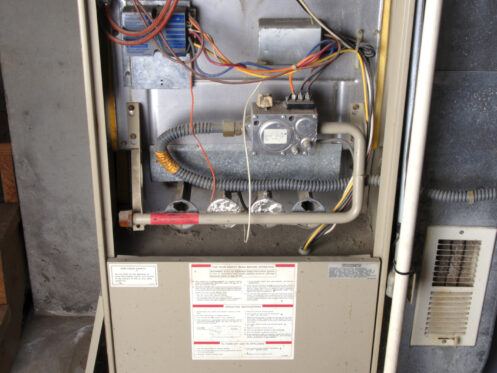Furnaces are perhaps the most popular way to heat a home in the United States. These units consist of complex internal systems that require regular maintenance and upkeep to work safely and efficiently. Unusual furnace noises can signify serious problems that can damage your property and even put your family’s safety at risk. Learning about the types of furnace noises you should never ignore can help you resolve issues before they escalate into HVAC emergencies.
Recognizing Strange Furnace Sounds
A furnace may make soft sounds when it periodically starts a new heating cycle. These quiet murmurs become “white noise” that fades into the background, ensuring the device is working properly. However, it is time to pay closer attention if the sounds become loud or unusual. Strange furnace sounds can indicate a variety of issues, including dirty burners, broken or defective components, faulty belts and fan motors, or damaged ignition switches.
Regardless of the cause, taking these unusual noises seriously and contacting a professional HVAC technician for help is essential. By fixing and diagnosing these issues early, you may prevent further damage and potentially circumvent costly repairs or premature replacements.
Rattling or Clanging Sounds
Rattling noises can be a sign of loose internal components. For example, loose screws or bolts within the unit can create a rattling sound. Over time, these fasteners may become dislodged due to the ongoing vibration or movement of the furnace. During maintenance, an HVAC technician can tighten or repair any loose parts. Broken motor fan blades can also make this rattling noise. Damaged components can impact other parts of the appliance and lead to system failure.
Banging Sounds
Banging noises are often the result of dirty burners. The biggest problem with dirty burners is that they can cause delayed ignition. Burners struggle to light properly when covered in dirt, soot, or debris. The dirt keeps the burners from igniting the gas, causing the gas to build up. When the gas finally ignites, the furnace makes a loud banging noise. This is essentially a mini explosion.
You should never ignore this banging noise because constantly delayed ignitions can cause cracks in the heat exchanger. Not only are heat exchangers expensive to repair, but damaged ones can leak deadly carbon monoxide gas into your home. Call a professional and evacuate the home immediately if you notice the gas’s rotten-egg smell in the house. Even if delayed ignition does not crack the heat exchanger, this inefficient combustion can reduce overall heating efficiency and create uncomfortable room temperatures.
Booming or Thumping Sounds
If you hear a booming sound several feet away from the furnace, it is usually the result of ductwork expanding or contracting. Your ducts could shift this way due to the following:
- Undersized ducts
- Blocked or closed vents
- Flimsy or aging ducts
- Dirty air filter
An HVAC technician can evaluate the ducts and determine the exact cause of the thumping.
Humming or Buzzing Sounds
A humming or buzzing noise can indicate a problem with the capacitor. The capacitor is a small electrical device that helps start the motor. If the capacitor fails, the motor can hum or buzz as it struggles to commence operation.
Grinding or Scraping Sounds
Harsh grinding or scraping sounds usually signify a problem with the blower wheel. The blower wheel is a crucial component that helps circulate heated air throughout the house. It wobbles and grinds against other parts if it becomes loose, making this scraping noise. An HVAC professional can fix the blower wheel or repair the wheel mount if needed. If the damage is extensive enough, the technician will need to replace the entire wheel assembly.
Chirping Sounds
Chirping sounds are often associated with alignment issues. If your furnace continues to chirp long after initial startup, the blower belt or blower pulley may be out of alignment. Eventually, the misalignment causes fraying, which prevents the belt from doing its job. This allows the mounting plate to touch the blower wheel and make a birdlike sound. Similarly, misaligned fan belts can also make a chirping noise.
Squealing or Screeching
Screeching or squealing sounds may arise from problems with the blower motor or blower bearings. You will need to contact a professional to disassemble the blower motor housing and fix the problem. A technician can also apply lubrication to the shaft of the motor bearings to eliminate excess friction and help them work properly again.
Whistling Sounds
Whistling sounds can indicate a clogged furnace filter. Over time, the accumulation of dirt, dust, debris, and particulate matter can obstruct your filter’s airflow. With this airflow restriction, the furnace unit must work harder to push air through. This strain produces a noticeable whistling sound and causes undue wear and tear that ultimately shortens the life span of your furnace. Be sure to change your air filters on a regular basis.
Whooshing Sounds
Whooshing is a sign of an air-to-fuel imbalance, meaning an incorrect ratio of air to fuel during the combustion process. This is common in older furnaces or units that are not properly calibrated. A technician can test and calibrate the machine to ensure smooth and efficient ignition, eliminating disruptive noises.
Rumbling Sounds
Rumbling noises are often caused by a dirty or obstructed pilot light. The pilot light is responsible for igniting furnace burners. When it cannot burn cleanly, you can hear turbulent sounds. You should not attempt to clean the pilot light yourself, as incorrect handling can increase the risk of natural gas leaks.
Popping or Clicking Sounds
Clicking sounds can indicate a faulty flame sensor or problems between the ignition and the gas. The flame sensor is a safety device located in the interior of the burner assembly. It monitors and verifies whether an active flame is burning inside the unit. When the sensor does not detect an active flame, it turns the furnace off to prevent gas leaks. But if the sensor is faulty, you might hear popping or clicking as it struggles to work. Due to its important safety function, any defects with the flame sensor require immediate professional attention.
Dangers of Ignoring Strange Furnace Sounds
While it may seem easy to disregard strange noises, doing so can result in HVAC emergencies. Risks of ignoring strange sounds include equipment damage, health hazards, and higher heating bills.
Equipment Damage
Some noises are quick and easy for qualified HVAC technicians to fix. However, ignoring the signs can lead to much greater equipment damage. For example, a technician can fix the chirping sound from a worn motor belt, but allowing your furnace to operate with a torn motor belt can break both the mounting plate and blower wheel, resulting in costly repairs.
Health Hazards
Several furnace noises indicate problems with the fuel-burning process. This can lead to carbon monoxide poisoning. Carbon monoxide is a tasteless, colorless, odorless gas that causes illness or death in high concentrations.
Increased Energy Costs
When furnace components are defective, the unit has to work harder to heat the rooms of your home. This extra cycling results in higher heating bills.
Get Help Today
Hearing strange furnace noises should alert you to a deeper underlying issue. Fortunately, the experts can help. Laury Heating Cooling & Plumbing provides heating, cooling, and plumbing services for homes in Pennsville, Vineland, and throughout the South Jersey area. We offer furnace maintenance as well as new heating and cooling installation and repair. Our technicians can also make natural gas conversions and install ductless heating based on your preferences. Contact Laury Heating Cooling & Plumbing today for all your HVAC and plumbing needs.



